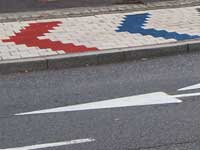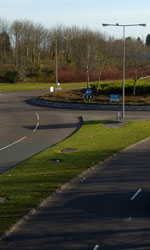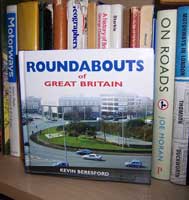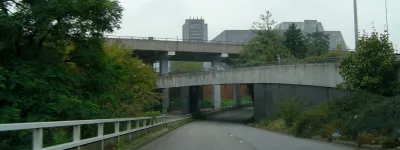
There's no mistaking it - despite its foreign roots, the roundabout has been welcomed into British life with open arms and, to most natives, it's as much a part of modern British life (and culture) as beans on toast and complaining about Bank Holiday traffic.
Some might even say we've become a little obsessed with roundabouts now and then. Surely not. But there does seem to be something about this one particular type of junction that attracts a certain kind of affection.
Milton Keynes

The 185,000 residents of a certain town in Buckinghamshire are hard-suffering people. They seem largely proud of their town and claim that it is a nice place to live. However, the fact remains that to anyone who doesn't live there, the name Milton Keynes means two things: concrete cows and roundabouts.
The largest and probably the most successful of the New Towns of the 1960s and 70s, Milton Keynes has a road network laid out in grid squares, with a roundabout at every crossing point (one is shown left; click to enlarge). The junctions are so prevalent that stories tell of cars there being more prone to tracking problems due to the amount of hard cornering they do. There are, by some reports, more than 300 of them in the town - or one for every 600 people.
In fact, MK is by no means unique as a New Town whose planners had an infatuation with circular interchanges. It has more to do with the prevailing design philosophy of free-moving traffic and grassy open spaces than anything else, and almost all New Towns designed in the sixties have copious numbers of roundabouts of their own.
Travel around the planned communities and concrete utopias of the twentieth century and you'll find yourself hitting a circular traffic island before too long. Glenrothes in Fife has scores of them and Telford and Harlow are almost overrun. Skelmersdale, ever the outsider, doesn't have an impressive number of them, but it does have a collection of some of the most preposterously huge roundabouts the world has ever seen.
Vicky Lamburn writes:
"Interesting fact about roundabouts and Milton Keynes. The grid road intersections were originally intended to be traffic light controlled crossroads in the main, with some having no traffic lights in the 'quieter' parts of the city (on the fringes). The Plan for Milton Keynes shows as much.
"Not sure how and why this changed, presumably the non-traffic light controlled junctions were built as roundabouts and this began to spread to all the junctions. The plan was published and approved the year construction began (with Queen Eleanor Street in Stony Stratford.)
"Arguably, MK would have been a bit more American if this did go ahead."
No, I insist, after you
The connection between Britain and its roundabouts is not just that we built them in huge numbers, of course. It runs much deeper than that. For one thing, they allow the possibility - much exploited by proud parish councils - of planting a garden in the middle of the road. Gardening is as English as cricket and cream teas, and a junction that lets you plant a shrubbery is clearly a good choice for the Brits.

More than that, roundabouts are polite. Traffic signals - much favoured in the USA and Germany, among other nations of roundabout sceptics - are strict and precise and robotic. (In fact, in South Africa, that's what they are called: robots.) You stop when it's red and you go when it's green and that's that. At a roundabout, you are interacting with the other drivers around you, and to get the best out of it, you all need to act politely and courteously towards each other, by signalling your intentions, taking the correct line through the junction and so on.
Could there ever be a situation better suited to the British psyche than one that involves a set of rules and a carefully balanced system that relies on etiquette and decorum? Better yet, it's self-enforcing, allowing us all to live out our little inner desires to act as policemen and keep each other in check.
You can break the rules at traffic lights with impunity if you squeak through after the green light vanishes or if you pass a red light when there's nothing coming. At a roundabout, you have to play by the rules because if you don't you'll bang in to someone. If it's safe to go, you're not breaking the rules, and if it's not safe to go, you'd better stop. There's no way to run a roundabout like you could run a red light. (Not that you should ever run a red light either, you understand.)
Mind your manners, obey the rules and take your turn: it's not just advice for using a roundabout. It could actually be a summary of British culture.
Fame and fortune
The result of all this is that our affinity with roundabouts is well known. The French - who, according to some unpatriotic souls, have more roundabouts than we do - normally call them rond-points, but it's not unheard-of to hear them referred to in conversation as rond-points anglaises, or "English roundabouts".

In American culture they tend to be portrayed as something baffling to Americans, best exemplified by the scene in National Lampoon's European Vacation where Chevy Chase repeatedly circles the roundabout at the east end of Lambeth Bridge and spots Big Ben anew every few seconds.
Closer to home, roundabouts have truly entered our culture now that there is a UK Roundabout Appreciation Society, which puts SABRE to shame as a minority interest group.
It has spawned a book - Roundabouts of Great Britain (shown left; click to enlarge) - and countless annual calendars celebrating the rotary junctions of a range of otherwise nondescript middle-England towns. It started, of course, with the publication of a calendar titled "Roundabouts of Redditch", which was a runaway publishing success.
In a country where we don't just drive around roundabouts, but actually go as far as to hang pictures of them on the wall and pay for the privilege, it should come as no surprise at all that we're associated with them the world over.
Picture credits
-
Image of roundabout in Milton Keynes taken from an original image by Paul Harrop, used under Creative Commons Attribution-Share Alike 2.0 licence.
